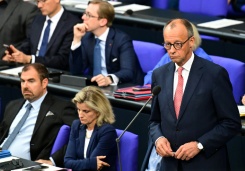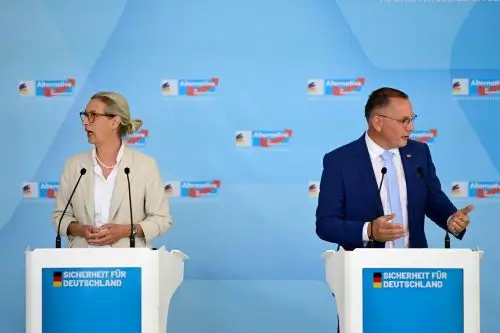
Germany's government, led by Chancellor Friedrich Merz (CDU), is embarking on a transformative path with a wide-ranging plan to overhaul the nation's economy and infrastructure. Amidst a fiery Bundestag debate on Wednesday, Merz staunchly defended his administration's decisions, portraying the reforms as a "necessary turnaround" vital for securing Germany's future.
This isn't merely about a massive €500 billion investment; it's about a fundamental shift in how Europe's largest economy will confront pressing challenges, from the cost of living and energy prices to migration and national defense, and how these choices will directly impact every individual living in Germany today.
The discussions in the Bundestag highlighted profound ideological rifts on the direction the country should take. While the government champions bold investment and strategic repositioning, opposition parties are sounding alarms about potential "debt orgies" and "social coldness," underscoring the high stakes for German citizens.

At the core of Chancellor Merz's vision is a push for substantial public investment, facilitated by a newly established "special investment fund" of €500 billion. This fund, which the government has secured the legal framework to borrow over time, is earmarked for critical areas: modernizing aging infrastructure, driving forward ambitious climate initiatives, and significantly upgrading Germany's military capabilities.
"We are laying the foundation for further substantial investments," Merz declared, acknowledging the financial risks but emphasizing the necessity of these measures to maintain Germany's global competitiveness. He pointed to encouraging signs of economic recovery, including stabilized growth forecasts and improving business sentiment, as evidence that the initial steps are yielding positive results.
One of the most immediate points of contention impacting everyday Germans is the government's stance on energy costs. Merz defended the decision to maintain reduced electricity taxes for key industries like manufacturing and agriculture, arguing that this is vital for preserving jobs and economic stability in these sectors.
However, a significant reversal from earlier coalition promises has left households with less direct relief. Merz confirmed that the planned extension of electricity tax cuts to families would not materialize. Instead, households will continue to receive approximately €150 in annual energy relief – a mere 75% of what was initially pledged.
"This is not abandoning families," Merz insisted, attempting to counter criticisms that the government is neglecting the financial pressures faced by ordinary citizens. This decision has sparked concerns about the unequal distribution of support, with businesses seemingly prioritized over individual consumers struggling with rising bills.
On migration, Merz reiterated his government's firm commitment to a "sustainable reduction" in immigration, framing it as essential for "restoring internal peace" within Germany. He highlighted a notable 43% drop in asylum applications in the first half of the year and commended coalition partners for supporting tougher measures, including the suspension of family reunification for certain refugees and stricter safe-country designations. These policies will directly affect individuals seeking refuge and those hoping to reunite with family members in Germany.
Beyond its borders, Merz called for Germany to assume a stronger leadership role in Europe, particularly in defense policy. He affirmed unwavering support for Ukraine, labeling Russia's government a "criminal regime" and cautioning that inaction would have severe repercussions for NATO and broader European stability. This signals a shift in Germany's traditionally cautious foreign policy, which could entail increased military presence and engagement in international affairs.

Opposition leaders launched blistering attacks on Merz's reform agenda:
These debates are not abstract political skirmishes. The decisions currently being made will profoundly shape the daily realities for everyone living across Germany:
For anyone residing and working in Germany, these pivotal choices will influence everything from their monthly energy bills and job prospects to the very fabric of society Germany will become over the next decade.
As Chancellor Merz's government pushes forward with its ambitious reform agenda, Germans face a crucial question: Is this unprecedented spending plan a bold and necessary investment in the nation's future, or a dangerous gamble that could deepen existing inequalities and burden future generations?
The coming weeks and months in the Bundestag will be critical, revealing whether Merz can maintain the delicate balance of his coalition and whether his vision for a stronger and more militarily capable Germany will resonate beyond the corridors of power in Berlin, truly impacting the lives of ordinary people.